Lin Jia-min (林家民) should have been in class, but the ninth-grader and two of his friends skipped their English bushiban last Saturday morning to attend a rally for peace in the Middle East. Clad in yellow and blue polyester uniforms, they joined a modest crowd gathered outside the American Institute in Taipei (AIT) to express their opposition to a war in Iraq.
"America and Great Britain must understand that fighting will not bring peace to people in Iraq," Lin said in A-plus English. "It's up to us to tell them." Lin and his friends weren't alone. That same day, millions of people in more than 600 cities across the globe took to the streets in what news reports called the biggest peace rallies since the Vietnam War. What was different about the demonstration in front of AIT, however, is that it was among the first of its kind for Taiwanese.
"This was the first anti-war protest of a large scale in Taiwan," said Hsia Chu-joe (
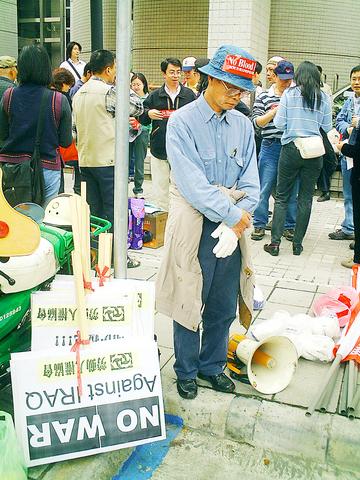
PHOTO: DAVID MOMPHARD, TAIPEI TIMES
Democracy protests
Of course the island has seen its share of protests. Taiwanese lived under martial law for 38 years -- the longest period in history -- until it was lifted in 1987. During those years, calls for democratization grew louder, with the Kaohsiung Incident of Dec. 10, 1979 the loudest of the calls. But democracy was really the only thing that brought Taiwanese voices together in protest. It was only after political liberalization that other movements began blossoming in Taiwan.
"We were called the pian di kai hua (遍地開花, flowers blossoming everywhere)," Hsia recalls. "After the lifting of martial law, besides the movement for democracy, there were others, such as the labor movement, the farmers' movement, student movement, womens' movement, gay and lesbian movements and the environmental movement, including people opposed to nuclear power."
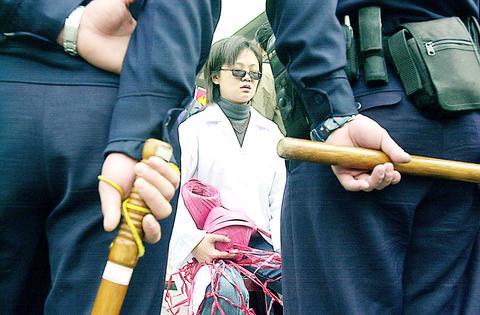
PHOTO: CHIANG YING-YING, TAIPEI TIMES
But each of these movements sought to affect domestic change only. Local protests directed at the international community were generally related to the country's isolation after losing its UN seat to China in 1971. Even then, the nation's misgivings were voiced almost exclusively through diplomatic channels, with few public protests attended by still fewer people. Rarely have matters of international concern brought Taiwanese to the streets, and even more rarely have they gathered to call for peace.
An exception came during the 1970s, when tensions arose over ownership of a small group of uninhabited islands northeast of Taiwan. The Tiaoyutai (釣魚台), or Senkaku Islands, have long been a source of conflict between Taiwan, China and Japan, each of whom claim them as part of their territory. The feud has nearly come to fisticuffs on a number of occasions since 1969, when the UN Economic Commission for Asia and the Far East reported possible hydrocarbon deposits underlying the islands.
For Taiwanese, the dispute stoked both nationalistic sentiment and cries for peace sounded by several professors within NTU's department of philosophy. As students became increasingly boisterous, authorities ultimately forced the university to close its philosophy department and fire those professors who had been stirring the students to action, effectively squelching the nascent peace movement.
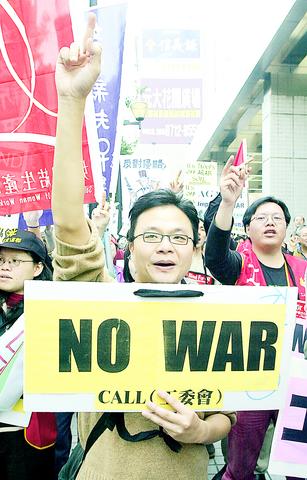
But many of those who rallied then were active again last Saturday. "Not since the 1970s have I seen such a protest!" Chien Yung-xiang (錢永祥), a former member of Academia Sinica's social sciences institute, told the crowd over loudspeakers. "I thought I would never see anything like it in Taiwan again."
What was the source of Chien's pessimism? Given the freedoms enjoyed by Taiwanese since 1989 and the tenacity with which they fought for democracy, it seems natural that they should rise up to voice their opinion on any international matter that concerns them; yet they have largely not risen up. Is it because the nation's domestic problems have rendered its global perspective short-sighted? Are Taiwanese overly apathetic towards international affairs? Are they ignorant of them? In over a dozen interviews for this article, each of these questions was answered with at least one resounding "yes" and equally resounding dissent.
"I haven't been following the news closely," says university student Andy Song (
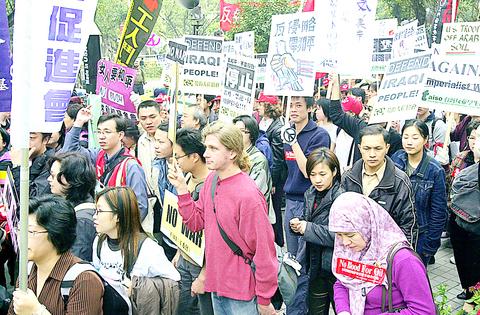
PHOTO: CHIANG YING-YING, TAIPEI TIMES
Is he opposed to a US-led invasion of Iraq?
"I think a peaceful solution would be best," he says.
Would he be willing to join a demonstration for peace?
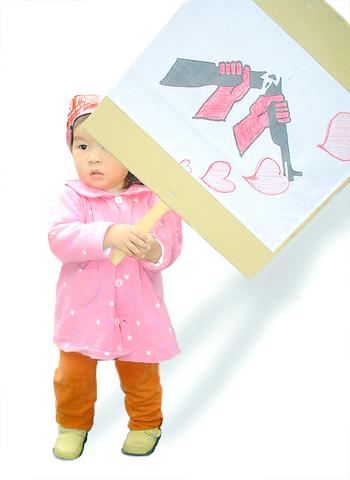
PHOTO: DAVID MOMPHARD, TAIPEI TIMES
"I'm too busy with classes and work."
Despite his lackluster interest, Song's answers are remarkably well-considered compared with others his age and at least one of his classmates.
Amanda Hsu quickly becomes agitated when talking about the possibility of another Gulf war. "The US has no right to wage war against Iraq," she says. "The people of Iraq voted Hussein into office. If they don't like him, they can vote him out of office."
Reminded by her friends that Iraq is not a democracy, Hsu changes tack.
"All they really want is the oil that's there," she says.
Would she be willing to join a demonstration for peace?
"I'm busy with classes, too," she demurs.
Their friend, Kevin Lee (李克文), has kept quiet throughout the conversation but, when pressed for his opinion, respectfully disagrees. "Look at North Korea and you can see why the US should get rid of Hussein," he says, echoing a line heard in recent news reports.
Does he think Taiwan should support the US in its efforts?
"It's because of the US that Taiwan is a democracy. If the US wants to give democracy to Iraq, then Taiwan can only support it," he says.
Lee is not alone, either. The majority of those interviewed agree with the US and British position that Hussein should be removed, and either tacitly or vocally support a US-led effort to do so by force if necessary.
NTU's Hsia believes Taiwan's historically close relationship with the US is one of the reasons the country's peace movement -- at least with regards to the present crisis in Iraq -- has gained little support. "Taiwan independence activists ... are pro-US government, therefore they are not anti-war," he said. "You should listen to the radio station Voice of Taiwan (台灣之聲) and hear the talk about joining the US as the 51st state."
Others cite the nation's rankling identity crisis to argue that, far from having a lackluster interest in world peace, Taiwan is a model of pacifism that other countries ought to emulate.
"Some say this is the `Republic of China.' Some say this is `Taiwan.' I'm an Aborigine and I say they're both wrong!" jokes 38-year-old Wang Rong-sheng (王榮生). "After 1949, the KMT spent years planning to `recover the mainland.' Now we're trying to keep the mainland from recovering us. ... We've lived with the threat of war for 50 years, all the while arguing with each other about who we are and what country this is. But we've (not) gone to war, either with China or with ourselves." Wang is against attacking Iraq but says he sees no point in attending peace rallies -- "I don't want to be seen on TV with everyone so loud and cursing." He believes that instead of Taiwanese shouting slogans in front of an office building, the government should advocate a peaceful resolution to the crisis in Iraq, and that it is remarkably well-positioned to do so.
"We Taiwanese, Chinese, Aborigines ... we know how to get along with our neighbors," Wang says. "If I have a neighbor I don't like, I still smile at him when I walk out my door and he still smiles at me. ... You ask if Taiwanese should think more about international affairs, I say other countries should look at how Taiwanese and Chinese have gotten along for so long."
Networking for peace
Chien Hsi-chieh agrees with Wang that Taiwan sets an ironically imitable example for other countries, but thinks Taiwanese should be more aware of their role in the international community. Having recognized the disparity of Taiwan's organizations dedicated to peace compared with other democratic nations, the former DPP legislator helped found the Peacetime Foundation of Taiwan (台灣促進和平文教基金會) in September of 2000. The organization endeavors to make contacts and network with peace organizations around the world, research case studies of crisis management and conflict resolution, and most notably to establish peace studies as part of the curriculum of every school in Taiwan.
"We've made progress," Chien says. "Fu Jen Catholic University now has a peace institute with whom we work very closely, and we've published two textbooks for use there and at other universities in Taiwan."
For Chien, peace education rides on the back of international studies, and it is his hope that Taiwan's nascent peace movement will make strides from the small steps it took last Saturday. "Regardless of wether the US bombs Iraq or not, Taiwanese are beginning to understand the importance of global peace," he says. "They must also appreciate the degree to which it affects them. I look at last Saturday morning and think they must be starting to."
Peacetime saw a spike in interest in the organization after last Saturday's rally and was rallying again yesterday afternoon. They were one of a coalition of over 30 local organizations that gathered at the Mitsukoshi Building across from Taipei Main Station to continue building popular support.
Lin was there too, still wearing his uniform from morning classes.
"I told my parents that coming here is an important part of my education, too," Lin said. "They were just happy that it started after bushiban."

On April 26, The Lancet published a letter from two doctors at Taichung-based China Medical University Hospital (CMUH) warning that “Taiwan’s Health Care System is on the Brink of Collapse.” The authors said that “Years of policy inaction and mismanagement of resources have led to the National Health Insurance system operating under unsustainable conditions.” The pushback was immediate. Errors in the paper were quickly identified and publicized, to discredit the authors (the hospital apologized). CNA reported that CMUH said the letter described Taiwan in 2021 as having 62 nurses per 10,000 people, when the correct number was 78 nurses per 10,000

As we live longer, our risk of cognitive impairment is increasing. How can we delay the onset of symptoms? Do we have to give up every indulgence or can small changes make a difference? We asked neurologists for tips on how to keep our brains healthy for life. TAKE CARE OF YOUR HEALTH “All of the sensible things that apply to bodily health apply to brain health,” says Suzanne O’Sullivan, a consultant in neurology at the National Hospital for Neurology and Neurosurgery in London, and the author of The Age of Diagnosis. “When you’re 20, you can get away with absolute

May 5 to May 11 What started out as friction between Taiwanese students at Taichung First High School and a Japanese head cook escalated dramatically over the first two weeks of May 1927. It began on April 30 when the cook’s wife knew that lotus starch used in that night’s dinner had rat feces in it, but failed to inform staff until the meal was already prepared. The students believed that her silence was intentional, and filed a complaint. The school’s Japanese administrators sided with the cook’s family, dismissing the students as troublemakers and clamping down on their freedoms — with

As Donald Trump’s executive order in March led to the shuttering of Voice of America (VOA) — the global broadcaster whose roots date back to the fight against Nazi propaganda — he quickly attracted support from figures not used to aligning themselves with any US administration. Trump had ordered the US Agency for Global Media, the federal agency that funds VOA and other groups promoting independent journalism overseas, to be “eliminated to the maximum extent consistent with applicable law.” The decision suddenly halted programming in 49 languages to more than 425 million people. In Moscow, Margarita Simonyan, the hardline editor-in-chief of the